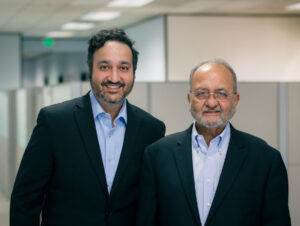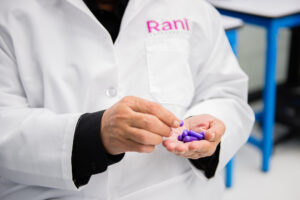
The list of biologics seems to be growing by the day. But biologics fall short of potentially reaching millions of patients because there hasn’t been a way to encapsulate them in a pill for mass distribution. And the truth is, not everybody likes needles, which is how biologics have traditionally been delivered.
Rani Therapeutics, a clinical-stage biotherapeutics company, based in San Jose, CA, is developing orally-administered biologics. Their novel, patented platform technology replaces subcutaneous or IV injection of biologics with oral dosing.
The concept was generated by the Indian medical inventor and entrepreneur Mir Imran, leading to the eponymous RaniPill capsule. As an entrepreneur, Imran has founded more than 20 life sciences companies; 15 of his companies have seen “liquidity events” (IPOs or acquisitions). Imran is perhaps best known for his pioneering contributions to the first FDA-approved Automatic Implantable Cardioverter Defibrillator.
The RaniPill capsule is an orally ingestible vehicle, approximately the size of a standard fish oil or calcium pill, which is designed to automatically administer a precise therapeutic dose of medication upon deployment in the small intestine. It works like a Trojan horse for biologics that makes its way through the stomach and then, like a tiny pufferfish, balloons up to inject payloads into the intestinal wall with naturally degradable microscopic needles.
Rani Therapeutics went public (NASDAQ: RANI) on July 30, 2021, and since then, the stock has enjoyed a steady rise, reaching a highpoint more than double the opening price of $11/share. With the IPO netting $73 million, Rani Therapeutics intends on using the new wave of financing to advance clinical trials of its robotic capsule.
GEN Edge spoke with Talat Imran, CEO of Rani—and son of Mir Imran, the company’s executive chairman—while the company was in the midst of its IPO, to discuss how they are disrupting the biologics market with their technology for oral delivery of peptides, proteins, and antibodies.
GEN Edge: What’s the process at Rani Therapeutics to develop a product?
Imran: We’re a bit different in that we take drugs that have already been approved, well-characterized, and have been through clinical trials. By and large, we get a drug supply from other companies, contract manufacturers, partners, and the like, and we make the RaniPill end-to-end in-house. So, the drug comes to us. We’re not innovating on the drugs as of yet, but we are innovating on the delivery.
GEN Edge: How does Rani choose which therapeutics to adopt?
Imran: At this point, the biologics market is fairly mature [and still growing]. Many trials and new drugs will come on the market this year, next year, and the years after that. But many are already off-patent. So we’ve had a fairly extensive library, if you will, of drugs to choose from. We looked at the ones that have the most burden on patients in terms of their injection frequency, the pain of those injections, and can access the drug between those we’ve made determinations on what to put in our pipeline.
Take diabetes, for instance. One out of ten Americans are diabetic. It’s not that different than other parts of the world. On top of that, one out of three Americans are pre-diabetic. So in just that one category alone, there’s a lot of people who could be helped. There’s no shortage of things we can do.
GEN Edge: Where does the company name come from?
Talat Imran: Our founder Mir Imran named it after his mother! Her name was Rani, which in Hindi means queen. This is sort of the queen or king of all drug delivery problems. How do you take a biologic and make it orally available? Because the gut evolved to digest biological materials. You don’t, as an example, absorb a virus through your gut. So, it’s tough to do. It’s not a new idea. Many people have tried to do it before us, but we’ve taken a different approach.
GEN Edge: What does your charted trajectory look like from here?

In the next few years, that means conducting additional clinical trials, meeting with the FDA, getting guidance from them on what the pivotal studies will look like out into the future. Ultimately, our mission is to get these drugs in pill form in the hands of patients. We’ve had good discussions with the FDA. We’ve had a pre-IND meeting where we came to understand what we would need to do in a clinical study to establish the safety and tolerability of the RaniPill platform as a platform not connected to a particular drug. So, that’s something that we plan to conduct.
GEN Edge: What kinds of challenges does Rani Therapeutics anticipate encountering?
Imran: It always just comes down to execution. We have the same hurdles as perhaps any biotech. We have to conduct clinical studies. We have to get good outcomes. We have to produce our product. We have to submit to the FDA. So these are all things that’ll come in time, and they’re all potential risks that we have to address and mitigate.
GEN Edge: Is this venture only operating within the US or internationally?
Imran: We’ll definitely take it internationally. There are [innumerable] patients worldwide who could benefit from oral biologic therapies, in our estimation. Our goal is to end injections for the millions of patients who have to do this regularly where we can.
GEN Edge: How is it having the company based out of San Jose?
Imran: There are many roots of biotech in the Bay Area. Genentech goes back into the seventies and there are tons of biotechs in South San Francisco. We happen to be in San Jose, where there are emerging biotech companies. It’s a very vibrant community. Better weather, too!
GEN Edge: What was the goal of going public?
Imran: Going public is a big decision. We’re proud of how hard everybody’s worked to get us to this point where, as a clinical-stage company, we completed a phase I clinical trial with one of our pipeline drugs. We plan to complete additional phase I trials with other drugs like TNF-alpha inhibitors and human growth hormone. It seemed like the right time, given the data, to go public and capitalize the business for those medicines.


